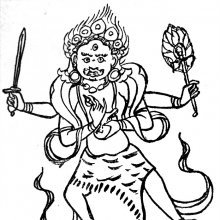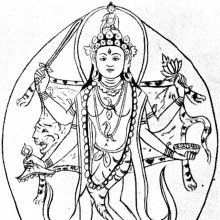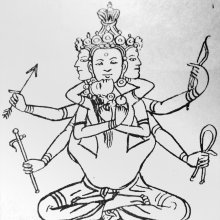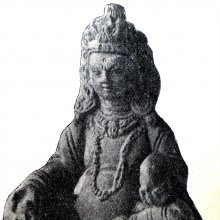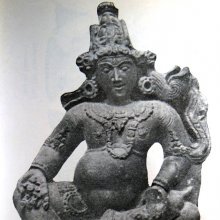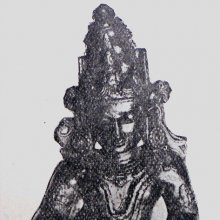Ashakti, Āśakti, Aśakti, Asakti, Āsakti: 23 definitions
Introduction:
Ashakti means something in Hinduism, Sanskrit, Jainism, Prakrit, Marathi, Hindi, Tamil. If you want to know the exact meaning, history, etymology or English translation of this term then check out the descriptions on this page. Add your comment or reference to a book if you want to contribute to this summary article.
The Sanskrit terms Āśakti and Aśakti can be transliterated into English as Asakti or Ashakti, using the IAST transliteration scheme (?).
Images (photo gallery)
In Hinduism
Samkhya (school of philosophy)
Source: Wisdom Library: Sāṃkhya philosophyAśakti (अशक्ति, “incapacity”) refers to a category of pratyayasarga (intellectual products) according to the Sāṃkhya theory of evolution. Pratyayasarga is the first of two types of sarga (products) that come into being during tattvapariṇāma (elemental manifestations), which in turn, evolve out of the two types of pariṇāma (change, modification). According to Īśvarakṛṣṇa, the defects of the eleven senses (indriyabadha) and the defects of the buddhi (buddhibadha) are said to make up incapacity (aśakti).

Samkhya (सांख्य, Sāṃkhya) is a dualistic school of Hindu philosophy (astika) and is closeley related to the Yoga school. Samkhya philosophy accepts three pramanas (‘proofs’) only as valid means of gaining knowledge. Another important concept is their theory of evolution, revolving around prakriti (matter) and purusha (consciousness).
Vyakarana (Sanskrit grammar)
Source: Wikisource: A dictionary of Sanskrit grammarAśakti (अशक्ति).—Incapacity to pronounce words correctly; cf. अशक्त्या कयाचिद् ब्राह्मण्या ऋतक इति प्रयोक्तव्ये लृतक इति प्रयुक्तम् (aśaktyā kayācid brāhmaṇyā ṛtaka iti prayoktavye lṛtaka iti prayuktam) M.Bh. on Śiva-sūtra 2.

Vyakarana (व्याकरण, vyākaraṇa) refers to Sanskrit grammar and represents one of the six additional sciences (vedanga) to be studied along with the Vedas. Vyakarana concerns itself with the rules of Sanskrit grammar and linguistic analysis in order to establish the correct context of words and sentences.
Vaishnavism (Vaishava dharma)
Source: Pure Bhakti: Bhagavad-gita (4th edition)Āsakti (आसक्ति) refers to “deep attachment, especially to Bhagavān and His associates; the sixth stage in the development of the bhakti creeper awakened after ruci (taste for bhajana) matures”. (cf. Glossary page from Śrīmad-Bhagavad-Gītā).
Source: Pure Bhakti: Bhajana-rahasya - 2nd EditionĀsakti (आसक्ति) refers to:—Attachment; this especially refers to attachment for the Lord and His eternal associates. Āsakti occurs when one’s liking for bhajana leads to a direct and deep attachment for the personality who is the object of that bhajana. This is the sixth stage in the development of the creeper of devotion, and is awakened upon the maturing of one’s taste for bhajana. (cf. Glossary page from Bhajana-Rahasya).

Vaishnava (वैष्णव, vaiṣṇava) or vaishnavism (vaiṣṇavism) represents a tradition of Hinduism worshipping Vishnu as the supreme Lord. Similar to the Shaktism and Shaivism traditions, Vaishnavism also developed as an individual movement, famous for its exposition of the dashavatara (‘ten avatars of Vishnu’).
Ayurveda (science of life)
Toxicology (Study and Treatment of poison)
Source: Shodhganga: Kasyapa Samhita—Text on Visha ChikitsaAśakti (अशक्ति) refers to “debility” and is a symptom caused by snake-bites (such as the Hemamaṇḍalī-snakes), according to the Kāśyapa Saṃhitā: an ancient Sanskrit text from the Pāñcarātra tradition dealing with both Tantra and Viṣacikitsā—an important topic from Āyurveda which deals with the study of Toxicology (Viṣavidyā or Sarpavidyā).—Accordingly, one of the treatments is mentioned as follows: “[...] A gruel made of Girikarṇikā, Vacā, Viśvā, Kuṇḍala and pepper is to be sprinkled. Honey mixed with Girikarṇikā must be smeared inside the nose. Yellowness of eyes, impaired hearing, anaemia, eye infection, water flowing down from the eyes and bleeding from the pores of the hair on the skin, debility (aśakti) and reduced vision are treated by applying a paste of Dvipatra, dry ginger, pepper, tamarind, root of Śigru and Vacā. [...]”.
Unclassified Ayurveda definitions
Source: gurumukhi.ru: Ayurveda glossary of termsAśakti (अशक्ति):—Lack of capacity todoproperly

Āyurveda (आयुर्वेद, ayurveda) is a branch of Indian science dealing with medicine, herbalism, taxology, anatomy, surgery, alchemy and related topics. Traditional practice of Āyurveda in ancient India dates back to at least the first millenium BC. Literature is commonly written in Sanskrit using various poetic metres.
Sports, Arts and Entertainment (wordly enjoyments)
Source: archive.org: Syainika Sastra of Rudradeva with English Translation (art)1) Asakti (असक्ति) refers to the “non-attachment” (to the pleasures of life), according to the Śyainika-śāstra: a Sanskrit treatise dealing with the divisions and benefits of Hunting and Hawking, written by Rājā Rudradeva (or Candradeva) in possibly the 13th century.—Accordingly, “[...] From these and other Vedic precepts, it appears desirable to enjoy the present fruits of previous actions, the enjoyment being, however, without too much attachment. It is known from the Śāstras that King Janaka, who was devoted to the interests of his subjects, attained liberation while enjoying the pleasures of life, and this was so, from his non-attachment (asakti) to them. [...]”.
2) Aśakti (अशक्ति) refers to a “detached” or “weak” (hawk) (as a result of little food), according to the Śyainika-śāstra.—Accordingly, [while discussing the training of hawks]: “In calling the hawk, either its wings should be tied or it should be covered with cloth. When it comes it should be rewarded by food, so that it may not be disappointed. [...] If highly fed, they grow naughty; if starved, they do not grow attached or strong (aśakti) [atipuṣṭastu vikṛtimaśaktim atikarṣitaḥ]. Birds of this clas are like low people. [...]”.

This section covers the skills and profiencies of the Kalas (“performing arts”) and Shastras (“sciences”) involving ancient Indian traditions of sports, games, arts, entertainment, love-making and other means of wordly enjoyments. Traditionally these topics were dealt with in Sanskrit treatises explaing the philosophy and the justification of enjoying the pleasures of the senses.
In Jainism
General definition (in Jainism)
Source: The University of Sydney: A study of the Twelve ReflectionsĀsakti (आसक्ति) refers to “uninterruptedly”, according to the 11th century Jñānārṇava, a treatise on Jain Yoga in roughly 2200 Sanskrit verses composed by Śubhacandra.—Accordingly, “Fool , having formed a delight [com.—āsakti—āsaktiṃ—‘uninterruptedly’] in pleasure which is produced by the objects of the senses [and is] continually transitory, the three worlds are destroyed”.

Jainism is an Indian religion of Dharma whose doctrine revolves around harmlessness (ahimsa) towards every living being. The two major branches (Digambara and Svetambara) of Jainism stimulate self-control (or, shramana, ‘self-reliance’) and spiritual development through a path of peace for the soul to progess to the ultimate goal.
Languages of India and abroad
Marathi-English dictionary
Source: DDSA: The Molesworth Marathi and English Dictionaryāsakti (आसक्ति).—f (S) Intentness upon; closeness of application; fondness of attachment; assiduousness of pursuit.
Source: DDSA: The Aryabhusan school dictionary, Marathi-Englishāsakti (आसक्ति).—f Zeal; intentnesss upon, close- ness of application.
Marathi is an Indo-European language having over 70 million native speakers people in (predominantly) Maharashtra India. Marathi, like many other Indo-Aryan languages, evolved from early forms of Prakrit, which itself is a subset of Sanskrit, one of the most ancient languages of the world.
Sanskrit dictionary
Source: DDSA: The practical Sanskrit-English dictionaryAśakti (अशक्ति).—f.
1) Weakness, impotence, powerlessness.
2) Inability, incapacity; श्रमेण तदशक्त्या वा न गुणानामियत्तया (śrameṇa tadaśaktyā vā na guṇānāmiyattayā) R.1.32.
3) (In Sāṅ. Phil.) Incapacity of the intellect to produce knowledge.
--- OR ---
Asakti (असक्ति).—f. The being detached from worldly feelings or passions; असक्तिरनभिष्वङ्गः पुत्रदारगृहादिषु (asaktiranabhiṣvaṅgaḥ putradāragṛhādiṣu) Bhagavadgītā (Bombay) 13.9.
Derivable forms: asaktiḥ (असक्तिः).
--- OR ---
Āśakti (आशक्ति).—f. Power, ability.
Derivable forms: āśaktiḥ (आशक्तिः).
Source: DDSA: The practical Sanskrit-English dictionaryĀsakti (आसक्ति).—f.
1) Attachment, devotion, fondness; बालिशचरितेष्वासक्तिः (bāliśacariteṣvāsaktiḥ) K.12; intentness, application.
2) Waylaying (Ved.).
-kti ind. Ved. Purposely.
Derivable forms: āsaktiḥ (आसक्तिः).
Source: Cologne Digital Sanskrit Dictionaries: Shabda-Sagara Sanskrit-English DictionaryAśakti (अशक्ति).—f.
(-ktiḥ) Inability, incapability, weakness, impotence. E. a neg. śakti power.
--- OR ---
Āśakti (आशक्ति).—f.
(-ktiḥ) Power, ability, might. E. āṅ before śakti power.
--- OR ---
Āsakti (आसक्ति).—f.
(-ktiḥ) Attachment to one object or pursuit, diligence, application. E. āṅ before ṣañj to embrace, ktin aff.
Source: Cologne Digital Sanskrit Dictionaries: Benfey Sanskrit-English DictionaryAśakti (अशक्ति).—f. want of strength, [Bhartṛhari, (ed. Bohlen.)] 2, 44.
Aśakti is a Sanskrit compound consisting of the terms a and śakti (शक्ति).
Source: Cologne Digital Sanskrit Dictionaries: Cappeller Sanskrit-English DictionaryAśakti (अशक्ति).—[feminine] inability.
--- OR ---
Asakti (असक्ति).—[feminine] non-attachment (to worldly things).
--- OR ---
Āsakti (आसक्ति).—[feminine] adhering, clinging to, pursuit, devotion; as [adverb] coherently, entirely.
Source: Cologne Digital Sanskrit Dictionaries: Monier-Williams Sanskrit-English Dictionary1) Aśakti (अशक्ति):—[=a-śakti] [from a-śakta] f. inability, incapability.
2) Asakti (असक्ति):—[=a-sakti] [from a-sakta] f. the being detached from worldly feelings or passions, [Bhagavad-gītā xiii, 9.]
3) Āśakti (आशक्ति):—[=ā-śakti] [from ā-śak] f. might, power, ability, [cf. Lexicographers, esp. such as amarasiṃha, halāyudha, hemacandra, etc.]
4) Āsakti (आसक्ति):—[=ā-sakti] [from ā-sañj] f. the act of adhering or attaching one’s self firmly behind
5) [v.s. ...] placing behind
6) [v.s. ...] waylaying, [Ṛg-veda]
7) [v.s. ...] devotedness, attachment
8) [v.s. ...] diligence, application
9) [v.s. ...] ind. uninterruptedly, wholly, throughout, [Śatapatha-brāhmaṇa]
Source: Cologne Digital Sanskrit Dictionaries: Yates Sanskrit-English Dictionary1) Aśakti (अशक्ति):—[a-śakti] (ktiḥ) 1. f. Inability.
2) Asakti (असक्ति):—[a-sakti] (ktiḥ) 2. f. Detachment from worldly objects.
3) Āśakti (आशक्ति):—[ā-śakti] (ktiḥ) 2. f. Ability.
4) Āsakti (आसक्ति):—[ā-sakti] (ktiḥ) 2. f. Attachment to one object or pursuit.
Source: DDSA: Paia-sadda-mahannavo; a comprehensive Prakrit Hindi dictionary (S)Aśakti (अशक्ति) in the Sanskrit language is related to the Prakrit words: Asatti, Āsatti.
[Sanskrit to German]
Sanskrit, also spelled संस्कृतम् (saṃskṛtam), is an ancient language of India commonly seen as the grandmother of the Indo-European language family (even English!). Closely allied with Prakrit and Pali, Sanskrit is more exhaustive in both grammar and terms and has the most extensive collection of literature in the world, greatly surpassing its sister-languages Greek and Latin.
Hindi dictionary
Source: DDSA: A practical Hindi-English dictionaryĀsakti (आसक्ति):—(nf) attachment; fascination; fondness, addiction.
...
Kannada-English dictionary
Source: Alar: Kannada-English corpusAśakti (ಅಶಕ್ತಿ):—
1) [noun] want of physical strength to do something or to resist a disease; weakness.
2) [noun] inability; incapacity.
--- OR ---
Āsakti (ಆಸಕ್ತಿ):—
1) [noun] intent attachment of mind; interest; devotion; fondness.
2) [noun] the sticking quality; adhesiveness; stickiness.
3) [noun] excessive love; attachment that is unreasonably emotional.
4) [noun] a strong longing for getting a thing.
Kannada is a Dravidian language (as opposed to the Indo-European language family) mainly spoken in the southwestern region of India.
Tamil dictionary
Source: DDSA: University of Madras: Tamil LexiconĀsakti (ஆஸக்தி) noun < ā-sakti.
1. Attachment; பற்று. புண்ணியத்தில் ஆஸக்தியுமில்லை பாபத் தில் பயமுமில்லை [parru. punniyathil asagthiyumillai papath thil payamumillai] (தென். இந். க்ஷேத். பக். [then. in. ksheth. pag.] 294).
2. Enthusiasm; ஊற்றம். அவனுக்குப் படிப்பில் ஆஸக்தி யில்லை. [urram. avanukkup padippil asagthi yillai.]
Tamil is an ancient language of India from the Dravidian family spoken by roughly 250 million people mainly in southern India and Sri Lanka.
See also (Relevant definitions)
Starts with: Ashaktikriyasu.
Ends with (+186): Abhyavaharanashakti, Achintashakti, Achintyashakti, Acintyashakti, Adbhutashakti, Adharashakti, Adityashakti, Adrishtashakti, Adyashakti, Aharashakti, Aishvaryashakti, Akalanashakti, Akarshanashakti, Akramashakti, Allashakti, Alpashakti, Amarashakti, Amoghashakti, Amtarikashakti, Anandashakti.
Full-text (+263): Asaktha, Agraha, Asatti, Asakuti, Acatti, Asakthi, Nashakti, Avashakti, Kamasakti, Varaha, Dinamishra, Samasakti, Vishayasakti, Tankarini, Ashaktate, Cicchakti, Andhata, Aishavira, Dipika, Nadini.
Relevant text
Search found 45 books and stories containing Ashakti, A-śakti, A-sakti, Ā-śakti, Ā-sakti, A-shakti, Aasagthi, Asagdhi, Asagdi, Asagthi, Asakthi, Āśakti, Aśakti, Asakti, Āsakti; (plurals include: Ashaktis, śaktis, saktis, shaktis, Aasagthis, Asagdhis, Asagdis, Asagthis, Asakthis, Āśaktis, Aśaktis, Asaktis, Āsaktis). You can also click to the full overview containing English textual excerpts. Below are direct links for the most relevant articles:
Bhakti-rasamrta-sindhu (by Śrīla Rūpa Gosvāmī)
Verse 1.3.8 < [Part 3 - Devotional Service in Ecstasy (bhāva-bhakti)]
Verse 2.5.13 < [Part 5 - Permanent Ecstatic Mood (sthāyī-bhāva)]
Verse 1.3.26 < [Part 3 - Devotional Service in Ecstasy (bhāva-bhakti)]
Contribution of Vachaspati-Mishra to Samkhya System (by Sasikumar. B)
Chapter 4.3 - Ethics In Sāṅkhya
Chapter 4.2a - Phenomenology in Sāṅkhya
Chapter 4 - Psychological, Phenomenological and Ethical Concepts (Introduction)
Bhajana-Rahasya (by Srila Bhaktivinoda Thakura Mahasaya)
Text 3 < [Chapter 6 - Ṣaṣṭha-yāma-sādhana (Sāyaṃ-kālīya-bhajana–bhāva)]
Text 1 < [Chapter 5 - Pañcama-yāma-sādhana (Aparāhna-kālīya-bhajana–kṛṣṇa-āsakti)]
Text 36 < [Chapter 2 - Dvitīya-yāma-sādhana (Prātaḥ-kālīya-bhajana)]
Brihad Bhagavatamrita (commentary) (by Śrī Śrīmad Bhaktivedānta Nārāyana Gosvāmī Mahārāja)
Verse 2.1.153 < [Chapter 1 - Vairāgya (renunciation)]
Verse 2.1.103 < [Chapter 1 - Vairāgya (renunciation)]
Shrimad Bhagavad-gita (by Narayana Gosvami)
Verse 7.2 < [Chapter 7 - Vijñāna-Yoga (Yoga through Realization of Transcendental Knowledge)]
Verses 13.8-12 < [Chapter 13 - Prakṛti-puruṣa-vibhāga-yoga]
Verse 13.24 < [Chapter 13 - Prakṛti-puruṣa-vibhāga-yoga]
Rig Veda (translation and commentary) (by H. H. Wilson)
Rig Veda 10.85.28 < [Sukta 85]
